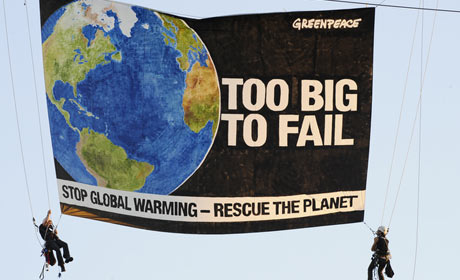
The following article appeared a few days ago in NatureNews. It should prove helpful in helping you understand the positions taken by the major two political parties in the US on the major issue of our time; Climate Change.
*************************************************************************************
US midterm elections: A chilly season for climate crusaders
Open scepticism of global warming could rule next Congress.
Jeff Tollefson
Nineteen of the 21 serious Republican challengers for seats in the US Senate believe that climate science is either "inconclusive" or "incorrect", according to an analysis by Washington DC's non-partisan National Journal. A more comprehensive list compiled by the left-leaning Wonk Room website suggests that 31 out of 37 Republican Senate candidates — including nine out of ten sitting senators — have recently disputed the science. Five of the remaining six actively oppose existing climate bills.
It is not clear exactly how concerns about climate-change regulations will affect the US midterm elections next month. Battles about political ideology and the state of the US economy are more pressing. But one thing is certain: scepticism about climate science has become one of the many litmus tests for candidates backed by the surging right. Even Senator John McCain of Arizona, who once championed climate legislation, has said that the world needs to know whether the scientific community's conclusions about global warming "were flawed by outside influences". In trendsetting California, where the science of climate change is not at issue between the leading gubernatorial candidates, concern over the economy could still lead to a deferral of greenhouse-gas emission cuts (see 'State watch: California').
Click here for more on the midterm elections.
If Republicans take the House or Senate, US climate scientists could be targeted for investigations that challenge findings related to global warming. In the House, Darrell Issa of California, the ranking Republican on the House Committee on Oversight and Government Reform, has promised to give climate science "a careful relook". In the Senate, long-time climate sceptic James Inhofe (Republican, Oklahoma) would relish the opportunity to subpoena climate scientists for hearings before the Committee on Environment and Public Works, which he is likely to chair if Republicans take control.
Democratic leaders pushed many members to vote for a comprehensive climate bill in the House in 2009, only to see the issue fizzle out in the Senate. Republican candidates are now using that vote to campaign against Democrats such as Zack Space, who has been accused by his Republican opponent in Ohio, state senator Bob Gibbs, of voting for a "cap-and-trade energy tax that will kill over 100,000 Ohio jobs".
The use of climate science as a weapon to skewer political opponents does not bode well for bipartisan progress on climate after the election. "If the message is that climate legislation is political poison, then that will make it harder to bring it up in the future," says David Goldston, director of government affairs at the Natural Resources Defense Council in Washington DC.
Prospects for the kind of emissions-trading programme that allows polluters to buy and sell permits on a fluid carbon market have already faded, says Frank Maisano, an energy specialist with the lobby firm Bracewell & Giuliani in Washington DC. Maisano notes that most of the sitting lawmakers who are likely to lose in November — moderate Democrats and Republicans — did not support aggressive action on climate science in any case. "This is regional politics, not partisan politics."
A more divided Congress could take up smaller initiatives targeting energy efficiency, renewable energy and long-term investments in clean-energy. But the Environmental Protection Agency (EPA) is poised to act on a 2007 court ruling giving it authority to regulate carbon-dioxide emissions. Some observers suggest that the fear of direct EPA regulation could help to spur a legislative solution among moderates of both parties.
That kind of political compromise might yet be possible if the climate rhetoric tones down after the elections. "Climate-science denial is a by-product of extreme partisanship and a kind of reactionary mode among conservatives, and I expect that this will wane," says Paul Bledsoe, a senior adviser to the Bipartisan Policy Center, a centrist think tank based in Washington DC. He says that most Republicans in the current Congress accept the science even if they disagree over what to do about it. "But if large parts of the Republican Party begin to deny consensus science," he adds, "then the climate community will have to confront them about it."
